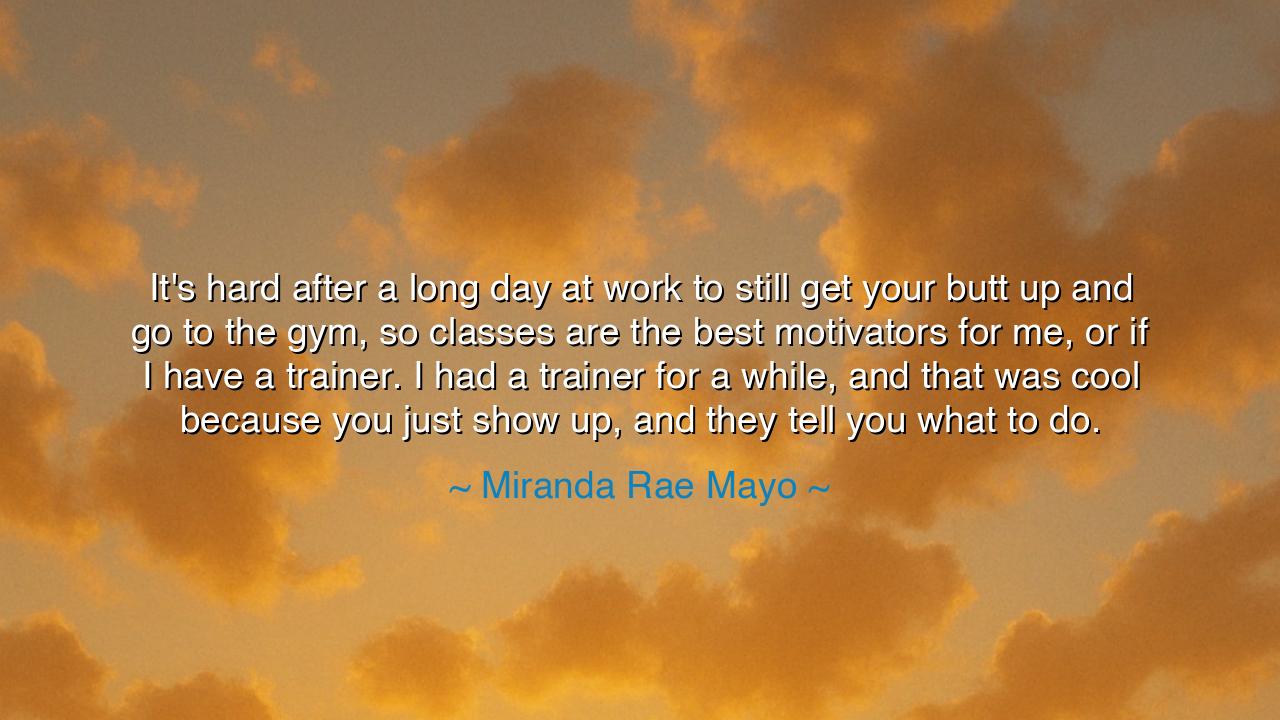
It's hard after a long day at work to still get your butt up and
It's hard after a long day at work to still get your butt up and go to the gym, so classes are the best motivators for me, or if I have a trainer. I had a trainer for a while, and that was cool because you just show up, and they tell you what to do.






"It's hard after a long day at work to still get your butt up and go to the gym, so classes are the best motivators for me, or if I have a trainer. I had a trainer for a while, and that was cool because you just show up, and they tell you what to do." These words from Miranda Rae Mayo reflect a universal struggle that has been with humanity since the dawn of time: the tension between effort and motivation. In our busy lives, where work demands so much of our energy and focus, finding the strength to push forward and take care of our bodies can feel like an insurmountable task. Mayo’s admission speaks to the ancient truth that we are not always capable of sustaining our own willpower and need external guidance and support to reach our highest potential.
The ancients understood this struggle well. In the time of ancient Greece, warriors trained tirelessly for battle, but they did not do so alone. They had their mentors and trainers, figures like Socrates and Aristotle, who not only imparted wisdom but also guided their physical development. The Greek ideal of the well-rounded individual, who was both wise and physically capable, required guidance, structure, and discipline. Just as Spartan warriors relied on their mentors to push them to greatness, so too do we rely on trainers and classes to motivate us in our own pursuit of strength and health. This practice of seeking external support is as old as humanity itself—a recognition that we are stronger when we walk the path with others by our side.
Similarly, in the Roman world, Gladiators did not train in isolation. Their physical prowess was honed through a strict regimen, often overseen by a trainer who knew exactly how to push their bodies to the limits. The trainers’ roles were essential, as they created routines that balanced the discipline of physical labor with the understanding of when to rest and recover. Like the gladiator facing the coliseum, we, too, face the daily battles of life, and it is often with guidance and structure that we can rise above the weariness that threatens to stop us. Just as the gladiators needed their mentors to guide them, we need the support of classes and trainers to remind us of our potential and help us overcome fatigue and distraction.
However, the wisdom of the ancients also teaches us that true strength comes not just from external discipline but from cultivating inner resolve. The Stoics, led by thinkers like Epictetus and Marcus Aurelius, believed that the ultimate strength came from within—through self-control, mindfulness, and persistence. They taught that the real battle is against the self, and true greatness comes when one can find the motivation to act not out of external rewards but from an inner sense of purpose and virtue. Just as Mayo speaks of the external motivation found in a trainer or class, the Stoics understood that the journey of self-mastery could not be done without structure. The key lesson here is that while external guides help us find our way, it is ultimately our own will that drives us forward.
The lesson in Mayo’s words is clear: even in the face of exhaustion and doubt, we must seek ways to fuel our motivation. Whether it is through the support of a trainer, a class, or a mentor, we all need moments of guidance and accountability to keep us on the path. The trainer is not simply someone who tells us what to do, but someone who believes in our potential and helps us unlock it. Just as ancient heroes found strength in their guides, so must we find our strength in those who challenge us, support us, and encourage us to continue when we feel like giving up.
The practical lesson we can take from this is that the pursuit of health—like the pursuit of wisdom or victory in battle—requires both internal resolve and external support. We must take the time to invest in our well-being by setting goals, establishing routines, and seeking out those who can help us stay on course. Whether it’s in the form of a trainer, a class, or a trusted mentor, we should never underestimate the power of community and structure in maintaining our physical and mental health. The ancients knew this, and we, too, must remember that in the company of others and with guided discipline, we can achieve things we never thought possible.
As we move forward in our lives, let us be inspired by the lessons of the past and the wisdom of those who came before us. Let us acknowledge that while strength and motivation come from within, we are often better equipped to pursue greatness when we embrace the help and guidance of others. In a world that often celebrates independence, let us remember that true strength lies not in isolation, but in the power of community, structure, and support.






AAdministratorAdministrator
Welcome, honored guests. Please leave a comment, we will respond soon